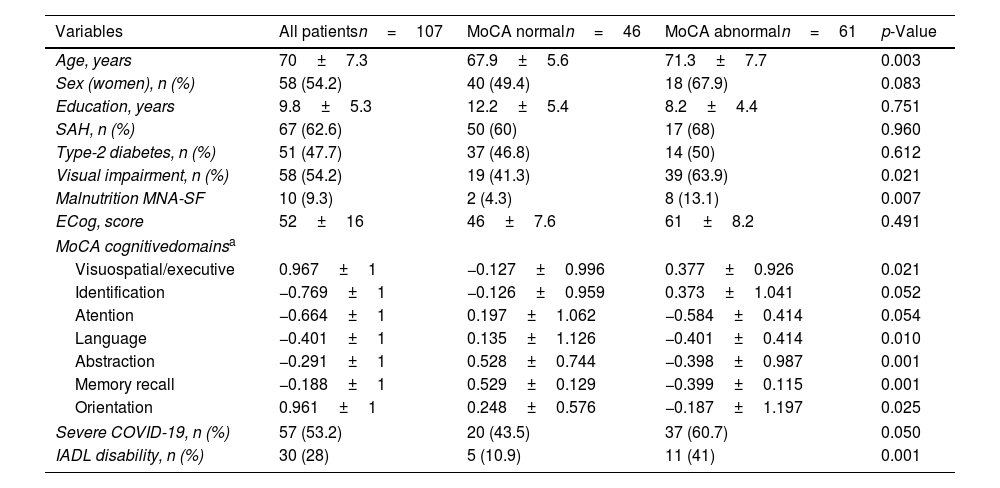SARS-CoV-2 infection has been associated with multiple short- and long-term complications including depression, and cognitive impairment (CI). However, older adults with CI after COVID-19 have not been fully documented.
ObjectiveTo evaluate cognitive function in Mexican adults post-recovery from SARS-CoV-2 infection.
MethodsIn this prospective observational cohort study, we assess cognitive function (CF) by the Montreal Cognitive Assessment (MOCA) test with a cut-off less than 26 points, and functional status via telemedicine. Eligible patients with a history of moderate–severe COVID-19 aged ≥60 years, cognitively healthy (evaluated by Everyday Cognition Scale) and required admission to an intensive care unit (ICU) were included. Patients with history of dementia, stroke, and delirium during the cognitive evaluation were excluded. The association between CI and COVID-19 was assessed with a Cox regression model.
ResultsFrom the 634 patients admitted to the ICU, 415 survived, afterward 308 were excluded and 107 were analyzed. Mean age was 70 years, 58% were female, and 53% had severe COVID.
The mean MoCA score was 21±5 points, CI was present in 61 patients (57%). Infection severity (RR 1.87; 95% CI: 1.11–3.15, p<0.05), lower education (RR 0.92; 95% CI: 0.87–0.97, p<0.01), and activity daily living disability (RR 1.87; 95% CI: 1.07–3.26, p<0.05) were the main factors associated with CI (unadjusted model by age and sex). The delayed recall, orientation, and language (83.2, 77.6 and 72.9% respectively) domains were the most affected in patients with CI.
ConclusionsFifty-seven percent of patients analyzed developed CI six months post-ICU discharge due to SARS-CoV-2, and COVID severity was the main factor associated to its outcome.
La infección por el virus SARS-CoV-2 se ha asociado con múltiples complicaciones a corto y largo plazo, como depresión y deterioro cognitivo (DC). Sin embargo, los adultos mayores con DC posterior a la covid-19 no han sido completamente estudiados.
ObjetivoEvaluar la función cognitiva en adultos mexicanos recuperados de la infección por SARS-CoV-2.
MétodosEn este estudio de cohorte observacional prospectivo, evaluamos la función cognitiva mediante la prueba de Evaluación Cognitiva de Montreal (MoCa) con punto de corte menor a 26 puntos y una breve evaluación geriátrica a través de telemedicina. Se incluyó a pacientes elegibles con antecedentes de covid-19 moderado-grave con edad ≥60 años, cognitivamente sanos (evaluados por la escala Everyday Cognition) y que requirieron atención en la unidad de cuidados intensivos. Se excluyó a los pacientes con antecedentes de demencia, accidente cerebrovascular y delirium durante la evaluación cognitiva. La asociación entre función cognitiva y covid-19 se evaluó con un modelo de regresión de Cox.
ResultadosDe los 634 pacientes ingresados en la UCI, 415 sobrevivieron; posteriormente 308 fueron excluidos y 107 analizados. La edad media fue de 70 años, el 58% eran mujeres y el 53% cursó con covid grave. La puntuación MoCA media fue de 21±5 puntos, el DC estuvo presente en 61 pacientes. La gravedad de la infección (RR 1,87; IC95%: 1,11-3,15; p<0,05), menor nivel educativo (RR 0,92; IC95%: 0,87-0,97; p<0,01) y discapacidad en la actividad de la vida diaria (RR 1,87; IC95%: 1,07-3,26; p<0,05) fueron los principales factores asociados al DC (modelo no ajustado por edad y sexo). Los dominios de recuerdo tardío, orientación y lenguaje (83,2; 77,6 y 72,9%, respectivamente) fueron los más afectados en pacientes con DC.
ConclusiónEl 57% de los pacientes desarrollaron deterioro cognitivo 6 meses después del alta de la UCI por SARS-CoV-2, y la gravedad de la covid fue el principal factor asociado a este desenlace.








